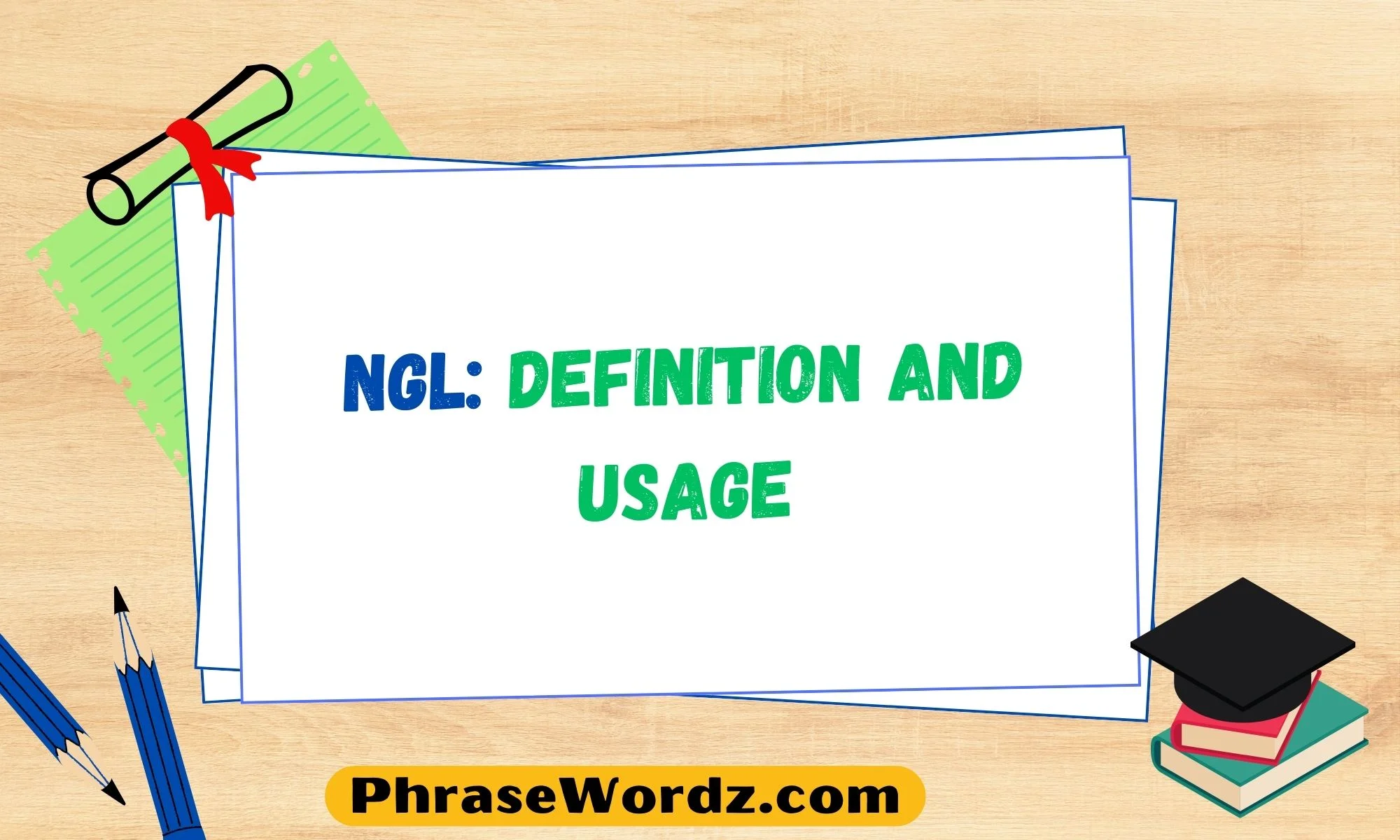In the fast-paced digital age, abbreviations and slang terms are commonplace in communication, especially on social media platforms, instant messaging apps, and even in casual conversations.
“NGL”, an abbreviation for “Not Gonna Lie,” has become a popular phrase used to preface honesty or directness. Understanding the nuances of “NGL” can enrich your grasp of contemporary English and enhance your communication skills.
This article will dive into the definition, history, and contexts of “NGL”, followed by practical usage examples, including emails and scenarios that demonstrate its relevance. Let’s explore every aspect of this trending term and learn how to use it effectively.
What Does “NGL” Mean?
“NGL” stands for “Not Gonna Lie,” and it is primarily used to introduce a truthful or candid statement. The phrase adds a conversational tone and is often employed to soften a remark that might come across as too blunt or forthright.
For example:
- NGL, this is the best pizza I’ve ever had.
- NGL, your performance in the meeting today was impressive.
Key Points to Remember:
- “NGL” typically conveys sincerity.
- It is widely used in informal settings but can occasionally appear in semi-formal contexts, depending on the relationship between the speakers.
History and Evolution of “NGL”
The phrase “Not Gonna Lie” has existed for decades as part of spoken English. However, its abbreviation to “NGL” gained traction in the early 2010s with the rise of text messaging and social media platforms like Twitter, TikTok, and Instagram. The compact form allows users to express themselves succinctly while maintaining a casual, approachable tone.
Cultural Significance
- Relatable honesty: “NGL” often prefaces statements that reflect personal opinions or observations.
- Humor and irony: It is frequently used in a humorous context to emphasize the contrast between expectation and reality.
How to Use “NGL” in Communication
Informal Conversations
In chats or social media, “NGL” adds a touch of sincerity to statements.
Example:
Conversation between friends:
- Alex: How’s the new restaurant?
- Sam: NGL, their tacos are phenomenal. You have to try them!
Emails and Semi-Formal Usage
While “NGL” is more common in informal settings, it can be strategically used in semi-formal emails to convey authenticity, especially in creative industries or casual professional relationships.
Scenario Example:
Subject: Feedback on the Presentation
Hi Rebecca,
NGL, I was initially skeptical about the approach you proposed during the last meeting. However, your presentation completely changed my perspective. The data was compelling, and the visuals were outstanding. Kudos to you for an excellent job!
Best regards,
Jake
Expert Tip: Avoid overusing abbreviations like “NGL” in professional emails, as they might appear too casual. Use them sparingly and only when the tone is appropriate.
Different Contexts for Using “NGL”
1. Expressing Positive Opinions
“NGL” can amplify the impact of a compliment.
Example:
NGL, you’re one of the most talented designers I’ve ever worked with.
2. Making Honest Critiques
It allows the speaker to provide constructive criticism in a softer tone.
Example:
NGL, this draft needs some improvement, but the overall concept is solid.
Addition: Always follow up with actionable feedback to maintain a positive dynamic.
3. Sharing Personal Experiences
“NGL” often prefaces vulnerable or relatable confessions.
Example:
NGL, I was nervous before the interview, but it turned out great!
4. Humor and Sarcasm
This abbreviation adds a playful or ironic twist to a statement.
Example:
NGL, I didn’t expect to enjoy this rom-com, but it was hilarious!
Scenario Examples of “NGL”
Scenario 1: Team Collaboration
Subject: Project Updates
Hi Team,
NGL, the last week has been challenging with all the unexpected changes. However, I’m incredibly proud of how everyone stepped up and adapted. Let’s keep this momentum going as we finalize the project this week.
Best,
Chris
Scenario 2: Casual Chat with a Friend
Text Exchange:
- Darcy: Did you enjoy the concert last night?
- Elizabeth: NGL, it was one of the best live performances I’ve ever seen. Totally worth the ticket price!
Common Mistakes When Using “NGL”
1. Overusing the Phrase
While “NGL” is engaging, excessive use can dilute its impact. Reserve it for moments when sincerity is key.
2. Using It in Highly Formal Contexts
Avoid abbreviations like “NGL” in formal reports, business proposals, or professional interviews.
3. Misinterpreting Tone
Be cautious with the context. A humorous use might not always be received as intended, especially in written communication without vocal tone or facial expressions.
Alternatives to “NGL”
If you want to avoid abbreviations or switch up your language, here are some alternatives:
- “Honestly”: Honestly, this is one of the best books I’ve read.
- “Truth be told”: Truth be told, I didn’t enjoy the movie as much as I thought I would.
- “To be honest (TBH)”: TBH, the meeting was more productive than I expected.
The Social Media Influence of “NGL”
Social media platforms like TikTok and Twitter have elevated “NGL” to a cultural phenomenon. Its brevity aligns perfectly with the character limits of these platforms, making it a favorite among users who value concise yet expressive communication.
Example:
Tweet: NGL, this weather makes me want to stay in bed all day.
Practical Exercises to Practice “NGL” Usage
- Rewrite Formal Statements with “NGL”:
Original: The cake was delicious.
With “NGL”: NGL, that was the best cake I’ve ever had. - Identify Tone: Create sentences using “NGL” in different tones (humorous, sincere, critical) and practice understanding the subtle differences.
Conclusion
“NGL” is more than just an abbreviation; it’s a cultural marker of honesty, relatability, and humor in modern communication. While its primary domain is casual conversations, it has found its way into semi-formal settings when used judiciously. By mastering its usage, you can enhance your communication skills and connect more authentically with others.
So, NGL, this article has equipped you with everything you need to know about this versatile term. Use it wisely, and watch your conversations become more engaging!











